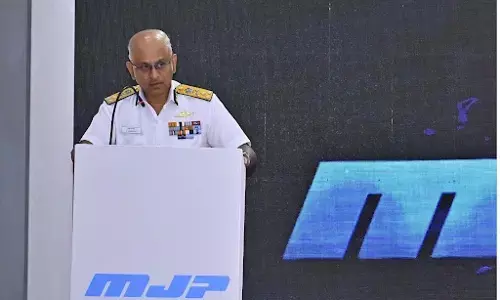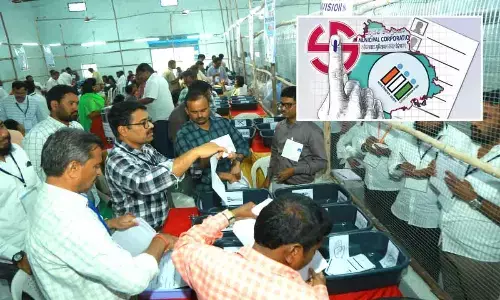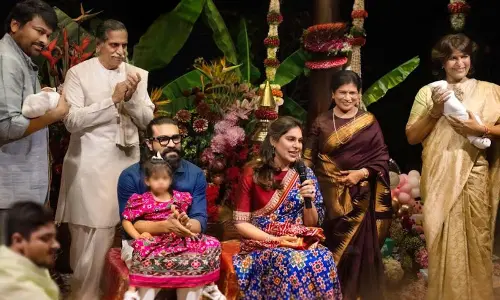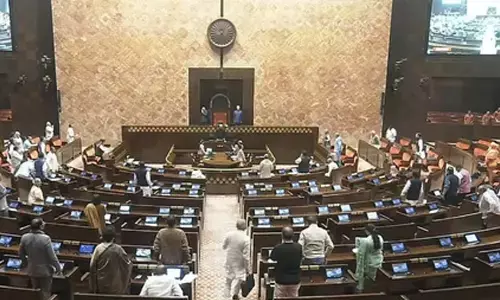ALLERGY TO DISSENT
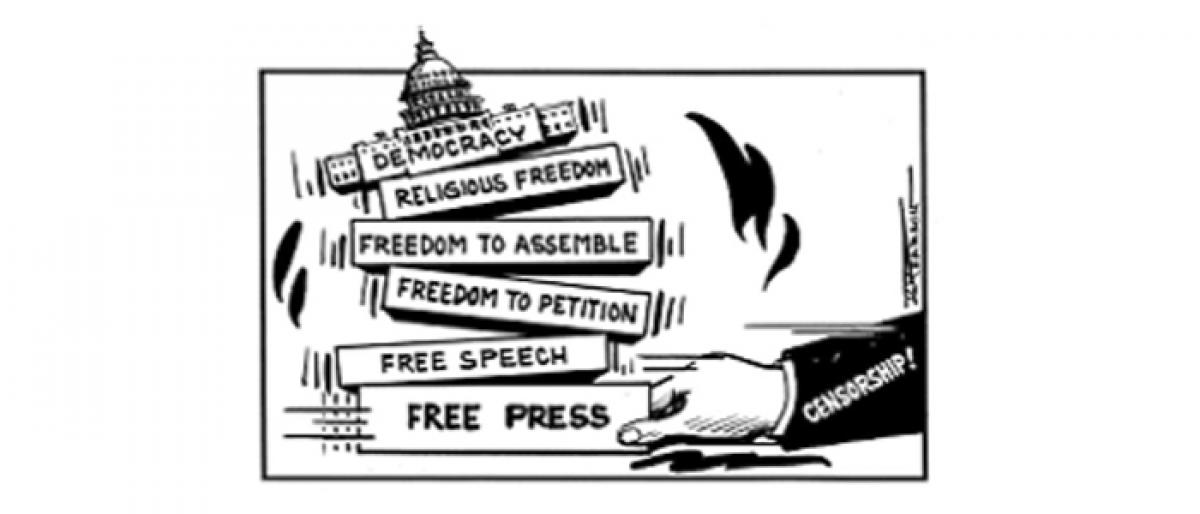
Where the press is free and every man able to read, all is safe,” according to Thomas Jefferson. The “Tamil Nadu police on Sunday arrested freelance cartoonist Bala G in Chennai for drawing a cartoon depicting the state’s inability to prevent a family from committing suicide in Tirunelveli.” Burdened by debt, Essakimutthu, a worker in Tirunelveli, had committed suicide along with his wife and chil
“Where the press is free and every man able to read, all is safe,” according to Thomas Jefferson. The “Tamil Nadu police on Sunday arrested freelance cartoonist Bala G in Chennai for drawing a cartoon depicting the state’s inability to prevent a family from committing suicide in Tirunelveli.” Burdened by debt, Essakimutthu, a worker in Tirunelveli, had committed suicide along with his wife and child, in front of the office of the District Collector, Tirunelveli.
The death of Mutthu and the children disturbed many, including Chennai-based cartoonist G Bala who drew a cartoon in which the Chief Minister, the Collector and the Superintendent of Police were shown watching while the child’s corpse burned. They were shown practically naked, in token of lost prestige. Bala posted the cartoon in his Facebook. The government immediately swung into action, but not the way one probably expects. Bala was arrested!
Angered and irritated by the cartoon, Sandeep Nanduri, the District Collector, wrote to the Police department of his intention to file a criminal case for offensive, derogatory and demeaning depiction. The police promptly registered an FIR and arrested Bala in the early hours of 5 November. And, after making him go round several police stations, they finally produced him in the Magistrate’s Court, but opposed the grant of bail to him. Ultimately, the District Judge granted bail to Bala. The law actually requires a public servant to approach a Session’s Court to file a case of criminal defamation under such circumstances. But the police not only took cognisance of a mere letter but also followed it up with regrettable vigour. The Madras High Court has since stayed the investigation for a period of four weeks.
In a series of raids, the Income Tax department recently unearthed huge amounts of undisclosed income and assets, owned by followers of Sasikala. How did Sasikala amass so much wealth? Was it not because of the former CM Jayalalithaa? The TN government had been markedly intolerant of criticism, and even an old and respected publication, “Ananda Vikatan” was not spared the ignominy of action.
The press naturally ran scared and hardly reacted to the increasing rot in the government. Those in power remained unaware of the goings-on. With no pressure on the government to mend its ways, it not only became unpopular but remained unaware if it. The entire structure of the ruling party collapsed following the death of its leader, and no one knows how long this government survives. All because the government was deaf to the “vox populi“.
The Government of Andhra Pradesh recently announced the ‘Nandi’ awards for cine-artists, for three years at one go. Perhaps anticipating criticism, the government warned that adverse criticism would entail ineligibility for the awards for three years. Neither is the Government of Telangana tolerant to criticism. It caused a ban on a TV channel for more than a year for telecasting news unfavourable to it. Had governments earlier in power behaved like this, no people’s movement would have sustained.
All this brings to mind the relationship between the famous cartoonist Shankar and Jawaharlal Nehru. Shankar was famous for caricaturing political leaders with biting satire. Nehru went to the extent of requesting him “not to spare” him. It was Nehru again, who stood by Chalapathi Rao, (the Editor of the National Herald), when the newspaper mischievously carried verbatim a letter by Nehru’s sister Krishna Hutheesing, as latter had specifically requested that it be so carried! Those were the days!
When the state of emergency was imposed in India in the year 1975, it was felt that President of Fakhruddin Ali Ahmed was forced to sign the ordinance in undue hurry and without having had time to apply his mind. The spirit of that situation was conveyed in a cartoon by Abu, carried by the Indian Express, showing the President signing a document while still in the bath tub.
In those days no cartoonist was arrested. Strange, therefore, that today when vulgarity, impropriety, violence and sex are rampant in the media, cartoons should have attracted such violent reprisal in Tamil Nadu. Even the Andhra Pradesh government recently ordered the arrest of a cartoonist who had posted some critical pieces on the Facebook.
Whether it is the media or the agitators, the governments of the day ought to accept news relating to issues currently agitating the public mind. They should realise that the leaders are usually surrounded by coteries of sycophants. Unless reports are heeded, they will remain oblivious to public resentment.
In 1979, when I was Collector of Krishna district, a news item appeared one day in the prestigious local daily ‘Eenadu.’ With screaming headlines, the item alleged that I had failed to implement a government programme for providing employment to the youth in the district. As a matter fact, I had not till then even been aware that such a scheme was, in fact, under implementation! Using the news to my advantage, I ascertained the details of the programme and ensured that it was properly implemented. Thereafter, many other consequences followed those incidents which are not relevant in this context. The point to note is that the role played by the media had a positive impact on my efforts.
For, if what the media had reported what was to be believed, I was not merely failing in my duty to implement government programmes, but also could be seen as having cooperated with the private bus operators (who were operating on routes which could have been allotted to the self-employed youth) by my inaction.
Indira Gandhi was a dynamic, popular leader. The imposition of the national emergency including censorship was, no doubt, a blot on her character. The Indian Express, in protest against censorship, carried a blank editorial. Indira did not take the cue. Certain good things happened under that harsh regime, but they were marred by a lot of harmful things. While enormous publicity was given to the acts of the government. on account of the censorship, she and her followers were oblivious of the adverse impact that their actions were having on the general public.
They were fed with biased and erroneous reports that all was well and that people were happy. That was the reason why a misled Mrs. Gandhi lifted the emergency and ordered elections. Once censorship was removed, all the atrocities that occurred earlier came to light and Mrs Gandhi‘s party suffered a terrible defeat. Even she lost.
Although history keeps teaching us such lessons, those in power rarely learn from them. By hook or by crook, by temptation or by fear, they keep desperately trying to obtain favourable coverage in the media. Unfortunate indeed! In sum, it is high time for the high and the mighty to pause, sit back and reflect upon the damage that can be caused to the fabric of good governance on account of their intolerant attitude towards the media.
There is, otherwise, the danger of our press also joining the ranks of those about whom John Swinton (formerly Chief of Staff, New York Times), warned “… Anyone who would be so foolish as to write honest opinions… will be put on the streets looking for another job… our talents… lives are… the property of other men… we are intellectual prostitutes.”




